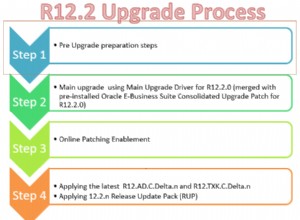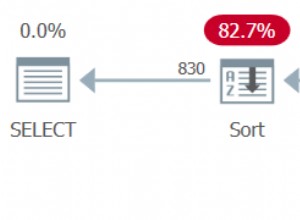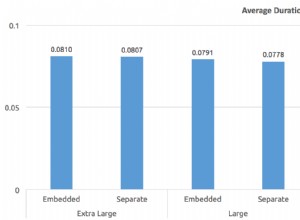Also gut, ich habe eine Migration geschrieben, um dies für mein eigenes System zu erreichen.
-
Sie können optional einen Verbindungsnamen angeben, um auf eine andere als die Standardverbindung zu verweisen.
-
Es erhält die Liste der Tabellen aus der Datenbank der Verbindung unter Verwendung eines
SHOW TABLESAbfrage. -
Dann durchläuft es jede Tabelle und aktualisiert alle Zeichenfolgen-/Zeichentypspalten mit dem neuen Zeichensatz und der neuen Sortierung.
-
Ich habe es so gemacht, dass ein Rückruf bereitgestellt werden muss, um zu bestimmen, ob die Länge einer Spalte auf die bereitgestellte neue Länge geändert werden soll oder nicht. In meiner Implementierung
VARCHARundCHARSpalten mit Längen über 191 werden während der Aufwärtsmigration undVARCHARauf die Länge 191 aktualisiert undCHARSpalten mit einer Länge von genau 191 werden bei der Rückwärts-/Abwärtsmigration auf die Länge 255 aktualisiert. -
Sobald alle Zeichenfolgen-/Zeichenspalten aktualisiert wurden, werden einige Abfragen ausgeführt, um den Zeichensatz und die Sortierung der Tabelle zu ändern, alle verbleibenden Sortierungen in die neue umzuwandeln und dann den Standardzeichensatz und die Sortierung der Tabelle zu ändern.
-
Schließlich werden der Standardzeichensatz und die Sortierung der Datenbank geändert.
Notizen
-
Ursprünglich habe ich versucht, die Tabellen einfach in die neue Codierung zu konvertieren, stieß aber auf Probleme mit Spaltenlängen. 191 Zeichen ist die maximale Zeichenlänge in
utf8mb4bei der Verwendung von InnoDB in meiner Version von MySQL/MariaDB und dem Ändern der Tabellensortierung kam es zu einem Fehler. -
Ich wollte zunächst nur die Längen auf die neue Länge aktualisieren, aber ich wollte auch eine Rollback-Funktion bereitstellen, daher war dies keine Option, da ich bei der umgekehrten Methode die Längen von Spalten festgelegt hätte, die
utf8mb4auf 255, was zu lang gewesen wäre, also habe ich mich entschieden, auch die Sortierung zu ändern. -
Ich habe dann versucht, nur die Länge, den Zeichensatz und die Sortierung von
varcharzu ändern undcharSpalten, die zu lang waren, aber in meinem System führte dies zu Fehlern, wenn ich mehrspaltige Indizes hatte, die solche Spalten enthielten. Anscheinend müssen mehrspaltige Indizes dieselbe Sortierung verwenden. -
Ein wichtiger Hinweis Dazu kommt, dass die Rückwärts-/Abwärtsmigration nicht für alle 100% perfekt sein wird. Ich glaube nicht, dass dies möglich wäre, ohne zusätzliche Informationen über die ursprünglichen Spalten bei der Migration zu speichern. Meine aktuelle Implementierung für die Rückwärts-/Abwärtsmigration geht also davon aus, dass Spalten mit der Länge 191 ursprünglich 255 waren.
-
Ein ähnlich wichtiger Hinweis Dies bedeutet, dass die Sortierungen aller Zeichenfolgen- / Zeichenspalten blind auf die neue Sortierung geändert werden, unabhängig von der ursprünglichen Sortierung. Wenn es also Spalten mit unterschiedlichen Sortierungen gibt, werden sie alle in die neue konvertiert und umgekehrt das gleiche, die Originale bleiben nicht erhalten.
<?php
use Illuminate\Database\Migrations\Migration;
class UpgradeDatabaseToUtf8mb4 extends Migration
{
/**
* Run the migrations.
*
* @return void
*/
public function up()
{
$this->changeDatabaseCharacterSetAndCollation('utf8mb4', 'utf8mb4_unicode_ci', 191, function ($column) {
return $this->isStringTypeWithLength($column) && $column['type_brackets'] > 191;
});
}
/**
* Reverse the migrations.
*
* @return void
*/
public function down()
{
$this->changeDatabaseCharacterSetAndCollation('utf8', 'utf8_unicode_ci', 255, function ($column) {
return $this->isStringTypeWithLength($column) && $column['type_brackets'] == 191;
});
}
/**
* Change the database referred to by the connection (null is the default connection) to the provided character set
* (e.g. utf8mb4) and collation (e.g. utf8mb4_unicode_ci). It may be necessary to change the length of some fixed
* length columns such as char and varchar to work with the new encoding. In which case the new length of such
* columns and a callback to determine whether or not that particular column should be altered may be provided. If a
* connection other than the default connection is to be changed, the string referring to the connection may be
* provided as the last parameter (This string will be passed to DB::connection(...) to retrieve an instance of that
* connection).
*
* @param string $charset
* @param string $collation
* @param null|int $newColumnLength
* @param Closure|null $columnLengthCallback
* @param string|null $connection
*/
protected function changeDatabaseCharacterSetAndCollation($charset, $collation, $newColumnLength = null, $columnLengthCallback = null, $connection = null)
{
$tables = $this->getTables($connection);
foreach ($tables as $table) {
$this->updateColumnsInTable($table, $charset, $collation, $newColumnLength, $columnLengthCallback, $connection);
$this->convertTableCharacterSetAndCollation($table, $charset, $collation, $connection);
}
$this->alterDatabaseCharacterSetAndCollation($charset, $collation, $connection);
}
/**
* Get an instance of the database connection provided with an optional string referring to the connection. This
* should be null if referring to the default connection.
*
* @param string|null $connection
*
* @return \Illuminate\Database\Connection
*/
protected function getDatabaseConnection($connection = null)
{
return DB::connection($connection);
}
/**
* Get a list of tables on the provided connection.
*
* @param null $connection
*
* @return array
*/
protected function getTables($connection = null)
{
$tables = [];
$results = $this->getDatabaseConnection($connection)->select('SHOW TABLES');
foreach ($results as $result) {
foreach ($result as $key => $value) {
$tables[] = $value;
break;
}
}
return $tables;
}
/**
* Given a stdClass representing the column, extract the required information in a more accessible format. The array
* returned will contain the field name, the type of field (Without the length), the length where applicable (or
* null), true/false indicating the column allowing null values and the default value.
*
* @param stdClass $column
*
* @return array
*/
protected function extractInformationFromColumn($column)
{
$type = $column->Type;
$typeBrackets = null;
$typeEnd = null;
if (preg_match('/^([a-z]+)(?:\\(([^\\)]+?)\\))?(.*)/i', $type, $matches)) {
$type = strtolower(trim($matches[1]));
if (isset($matches[2])) {
$typeBrackets = trim($matches[2]);
}
if (isset($matches[3])) {
$typeEnd = trim($matches[3]);
}
}
return [
'field' => $column->Field,
'type' => $type,
'type_brackets' => $typeBrackets,
'type_end' => $typeEnd,
'null' => strtolower($column->Null) == 'yes',
'default' => $column->Default,
'charset' => is_string($column->Collation) && ($pos = strpos($column->Collation, '_')) !== false ? substr($column->Collation, 0, $pos) : null,
'collation' => $column->Collation
];
}
/**
* Tell if the provided column is a string/character type and needs to have it's charset/collation changed.
*
* @param string $column
*
* @return bool
*/
protected function isStringType($column)
{
return in_array(strtolower($column['type']), ['char', 'varchar', 'tinytext', 'text', 'mediumtext', 'longtext', 'enum', 'set']);
}
/**
* Tell if the provided column is a string/character type with a length.
*
* @param string $column
*
* @return bool
*/
protected function isStringTypeWithLength($column)
{
return in_array(strtolower($column['type']), ['char', 'varchar']);
}
/**
* Update all of the string/character columns in the database to be the new collation. Additionally, modify the
* lengths of those columns that have them to be the newLength provided, when the shouldUpdateLength callback passed
* returns true.
*
* @param string $table
* @param string $charset
* @param string $collation
* @param int|null $newLength
* @param Closure|null $shouldUpdateLength
* @param string|null $connection
*/
protected function updateColumnsInTable($table, $charset, $collation, $newLength = null, Closure $shouldUpdateLength = null, $connection = null)
{
$columnsToChange = [];
foreach ($this->getColumnsFromTable($table, $connection) as $column) {
$column = $this->extractInformationFromColumn($column);
if ($this->isStringType($column)) {
$sql = "CHANGE `%field%` `%field%` %type%%brackets% CHARACTER SET %charset% COLLATE %collation% %null% %default%";
$search = ['%field%', '%type%', '%brackets%', '%charset%', '%collation%', '%null%', '%default%'];
$replace = [
$column['field'],
$column['type'],
$column['type_brackets'] ? '(' . $column['type_brackets'] . ')' : '',
$charset,
$collation,
$column['null'] ? 'NULL' : 'NOT NULL',
is_null($column['default']) ? ($column['null'] ? 'DEFAULT NULL' : '') : 'DEFAULT \'' . $column['default'] . '\''
];
if ($this->isStringTypeWithLength($column) && $shouldUpdateLength($column) && is_int($newLength) && $newLength > 0) {
$replace[2] = '(' . $newLength . ')';
}
$columnsToChange[] = trim(str_replace($search, $replace, $sql));
}
}
if (count($columnsToChange) > 0) {
$query = "ALTER TABLE `{$table}` " . implode(', ', $columnsToChange);
$this->getDatabaseConnection($connection)->update($query);
}
}
/**
* Get a list of all the columns for the provided table. Returns an array of stdClass objects.
*
* @param string $table
* @param string|null $connection
*
* @return array
*/
protected function getColumnsFromTable($table, $connection = null)
{
return $this->getDatabaseConnection($connection)->select('SHOW FULL COLUMNS FROM ' . $table);
}
/**
* Convert a table's character set and collation.
*
* @param string $table
* @param string $charset
* @param string $collation
* @param string|null $connection
*/
protected function convertTableCharacterSetAndCollation($table, $charset, $collation, $connection = null)
{
$query = "ALTER TABLE {$table} CONVERT TO CHARACTER SET {$charset} COLLATE {$collation}";
$this->getDatabaseConnection($connection)->update($query);
$query = "ALTER TABLE {$table} DEFAULT CHARACTER SET {$charset} COLLATE {$collation}";
$this->getDatabaseConnection($connection)->update($query);
}
/**
* Change the entire database's (The database represented by the connection) character set and collation.
*
* # Note: This must be done with the unprepared method, as PDO complains that the ALTER DATABASE command is not yet
* supported as a prepared statement.
*
* @param string $charset
* @param string $collation
* @param string|null $connection
*/
protected function alterDatabaseCharacterSetAndCollation($charset, $collation, $connection = null)
{
$database = $this->getDatabaseConnection($connection)->getDatabaseName();
$query = "ALTER DATABASE {$database} CHARACTER SET {$charset} COLLATE {$collation}";
$this->getDatabaseConnection($connection)->unprepared($query);
}
}
Bitte, bitte, bitte sichern Sie Ihre Datenbank, bevor Sie dies ausführen . Verwendung auf eigene Gefahr!




